
Pound land
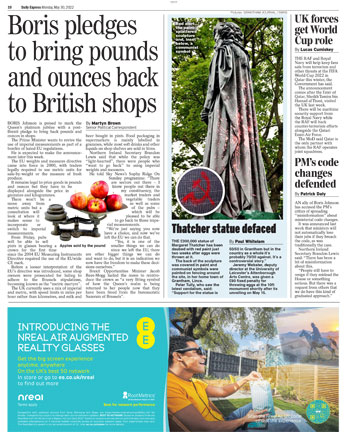
It’s been a quiet couple of weeks, news wise, hasn’t it? I guess it always is around the time of a bank holiday. So, it’s unsurprising that the papers have had to fall back on those old favourites: Boris and the royals. So unimaginative; it’s not as though they’ve been up to much lately, is it?
I mean, couldn’t they focus on the things that matter to people. Like the cost of living, the war in Ukraine, hospital waiting times?
Yes, I’m being facetious. But only a bit. The papers that shout the loudest about the “distractions” of Partygate, Tory rebellions and so on are also the ones that pounce on any ex-feline tossed out of Downing Street. The most recent example being the leopard (aka the ounce) whose revival, along with the pint mug crown, was mooted as part of the jubilee celebrations. That’ll be the imperial measure that we decided to junk a decade before we joined the EEC. And the imperial symbol that (like the blue passport) was never banned by the EU. Whatever the Mail on Sunday would have us believe.
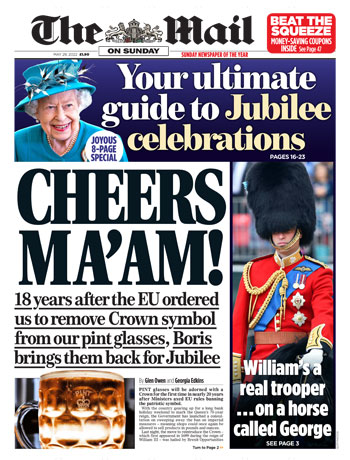
The promise of a consultation (which is several steps away from actually doing anything – as that Tory MP who decided to back Johnson after being promised a “review” of funding for the Isle of Wight will probably come to realise) on allowing traders to sell goods only in pounds and ounces created an awful lot of hot air and the demise of an awful lot of carbon-sucking trees. So a double whammy for the environment to absolutely no good purpose.
“Boris pledge to bring pounds and ounces back to British shops” trilled the Express as though a return to units of measurement that are alien to anyone under 50 was a sign of progress. And of course there is no intention to do anything of the kind. Traders are, and always have been, at liberty to mark prices up in lbs and oz – so long as they are alongside the more widely understood kg and g. The vast majority – even market stall greengrocers – choose not to do so. Now “Boris” has decided that, if they wish, they might – depending on the results of the consultation – be allowed to ditch the kg. They won’t want to.
But that hasn’t stopped businesses popping up and saying “It’ll add to costs” and “experts” of all hues saying “hurrah!” or “you must be mad!”
So, we have a consultation process, possibly followed by legislation or statute – neither of which comes without cost – for something only a few green-ink dinosaurs have asked for. When all is said and done, life will carry on as before. And here I am, adding to the volume of wordage being pumped out on the subject. This country really has gone mad.
How long’s he got?
The imperial nonsense was, of course, yet another distraction pumped out by an administration whose sole purpose seems to be to keep the prime minister in office. And, as I write, he is still there. The letters to Graham Brady duly went in, the vote of no confidence duly went ahead (a couple of days earlier than most expected), and Boris Johnson duly won it. As we all knew he would.
The anti-Johnson press predictably predicted that he would be gone by summer / Christmas / the next election; the pro-Johnson press predictably proclaimed that he should now be allowed to get on with the things that matter (see above).
The antis and the neutrals both pointed out that a greater proportion of his MPs had had enough of him than voted against Theresa May, who was out within six months. But I think everyone can agree that Boris Johnson is not Theresa May and that to conclude with confidence that he will suffer a similar fate is to ignore their different circumstances – he has a huge parliamentary majority and he isn’t trying to get a Brexit deal through the Commons – and their different characters.
So while the Mirror may try to convince itself that it’s only a matter of time, the Times, Telegraph, FT and Guardian are wise to fill their prognoses with caveats. None of those four, it must be said, seems particularly enthused by the prospect of two more years of a Johnson administration. Here’s Robert Shrimsley in the FT: “Johnson has had three years to prove the great campaigner can be an effective premier. Instead he has shown himself distracted, chaotic, weak, self-serving, dishonest and addicted to government by headline. As he fought to save his leadership, what new measure did he wave before his party? A pledge on restoring imperial measurements. He now has one, possibly final, chance to show he is the man all evidence suggests he isn’t.”
And the Times leader: “If Mr Johnson is to avoid leading the Tories to a calamitous defeat in the next election, he will need to show a degree of grip and focus that has been largely absent so far in his premiership, even under his current third team of advisers. Yet the danger is that his authority has been so badly dented that he will find it increasingly hard to get anything done. The temptation instead will be to continue to seek to shore up his position by seeking to foment new divisions, whether by fostering culture wars at home or stoking new conflicts with the European Union, or indeed launching fresh assaults on British institutions.”
At which point, I need to reiterate the fact that the paper urged Conservative members to install Johnson as their leader in the summer of 2019 and to vote for him in the general election later that year.
More surprising, perhaps, has been the waning of support from the Telegraph, whose leader points out that many of his MPs no longer trust the Prime Minister, who, it says, has managed to alienate both wings of his party at the same time: “His victory allowed Mr Johnson to urge the party to put their divisions aside and let him get on with the job of governing. His difficulty, however, is that it is he who is causing those divisions.”
Maybe Johnson is not “Conservative” enough for the Telegraph – which, in common with many of the party’s MPs, is unhappy about the fact that he is presiding over the highest level of taxation of modern times – or maybe it just wants him back writing £10,000-a-pop columns.

He is certainly not “Conservative” enough for Allison Pearson, who has been besotted with Johnson almost forever. Remember that picture of her as the supposedly neutral host of a leadership contest event, gazing up at him with adoration? How, once he was in office, she declared herself “pro-rogue” when it was mooted that he might shut down Parliament – at a time when the idea was widely being dismissed as unthinkable? How she wrote that at her summer parties, everyone was full of how much they loved him, how he lifted the spirits?
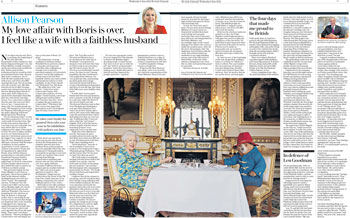
Not any more. Now she has declared the love affair over, that she feels like the wife of a faithless husband (had she not realised before that that was what he was? It’s been pretty well documented and accepted even by his supporters). She has ventured into by-election territory and what she heard there was not good for the party.
Straw polls are unreliable at the best of times: The Sun did one after the confidence vote and the first three people it quoted said “Boris should definitely stay” (strange they all used the same form of words, but whatever). Meanwhile over at the Times, all six correspondents in the lead segment of the letters page said he should go. As in Pearson’s mini-survey, almost all of these opinion offerers were Tory voters. Are they a barometer of what people truly think – or is it a case of asking the question enough times and then printing the answers that best suit your purpose? Would people who are happy with the situation bother to write to a newspaper?
Who’s plotting?

Over in the loyalist camp, the Express is insisting that everything will be all right now, while the Mail is as angry as ever at the “rebels without a clue” who have been “plotting for over a YEAR”. What are they thinking of? They will just let in the “coalition of chaos” that would be “smirking Starmer”, the LibDems and the SNP. An unfortunate alliterative allusion, I would maintain, given David Cameron’s “simple and inescapable choice” in 2015: “Stable and strong government with me or chaos with Ed Miliband”. Because it’s been smooth sailing all the way since the country chose the former, hasn’t it?
And, of course, once Cameron had got that mandate, the Mail did everything it could to undermine the man it had championed.
Back, briefly, to the present to note that while the Mail is railing at the “plotters”, the point everyone else is making about Monday’s vote is that the rebels come from disparate wings of the party, that they are unhappy about different aspects of the government’s performance, that there is no central standard bearer (like Heseltine with Thatcher) or awkward squad (like the ERG with May). They aren’t working together to unseat the PM, they’re attacking from all angles.
Then (Theresa May) and now (Boris Johnson)

But now I want to hark back to the past because both the Mail and the Express are taking the same “draw a line under this and get on with the job” approach with Johnson as they did with May. Which you might say is inconsistently consistent, since the two men doing their utmost to destabilise their heroine of the day in 2018 are the people they are now defending: Johnson and Jacob Rees-Mogg. Johnson was writing provocative columns that provided Monday splashes for the Telegraph, while Mogg was out there vociferously sending in his letters and declaring that May’s 200-117 win was a very bad result, a disaster, and that she should urgently resign.
On the day before that vote, the Mail splash was “The vultures are circling”, and the page 2 lead was about Sajid Javid and Johnson positioning themselves for leadership bids. But the most interesting offering (Captain Hindsight writes) was Dominic Sandbrook’s column on the inside spread, headlined “Shameful coup is the last thing Britain needs”. The “pin-striped conspirators” – the “ultra-Brexiteers Boris Johnson, Jacob Rees-Mogg and their various cronies and hangers-on” – were cowardly and gutless, he wrote.
“When, every Monday morning, Mr Johnson produces some new scenario for the readers of his newspaper column, he is literally wasting everybody’s time. He is the equivalent of a teenage boy working on his plans for world domination after his election as President of Earth.
“Does anybody really believe people such as Mr Johnson and Mr Rees-Mogg are entirely untainted by personal ambition? Isn't it blindingly obvious that they are far more interested in posturing on television, playing to the gallery and boosting their leadership prospects than in protecting British businesses and British jobs?”
I’m sure Mr Sandbrook will thank me for reminding the world of that.
And then, the day after the vote, up popped Sarah Vine to announce “Now the venal wreckers must get behind her”. This week she is again behind the leader, with “The great blusterer needs a reboot. But there’s still no one who’d do job better”. Not even that woman from the back benches who went to vote in her ballgown?
Meanwhile Sandbrook was noting that Monday had seen “the triumph of sectarianism, divisiveness and ideological self-indulgence”. But this time it was not the Tory plotters who were angering him. It was the RMT with its plans for industrial action. He, like his paper, has moved on and it’s time to attack the “hard left” union and the Labour party that has “failed to condemn” the coming strikes.
Those Theresa May issues were, of course, produced under the editorship of Geordie Greig, who had just taken the chair from Paul Dacre. He had, as Mail on Sunday editor, backed Remain and there were many (not me) who detected a gentler, less Brexity paper in his hands. His Mail was strident in its support of May and her proposed deal, which was being derided by the ERG and derailed by deluded Remainers, but Dacre’s Mail had been just as supportive, denouncing MPs who stood in her way. Now the daily is in the hands of Ted Verity, who succeeded Greig at the Sunday, and overseen by Dacre, both of whom seem determined to prolong the Brexit war, laying every inconvenience and annoyance at the door of “embittered Remainers” or the “biased BBC”. Greig’s Mail does now seem gentler by comparison.
But there are other papers available. So here, just for a bit of fun, is a collection of “then and now” covers after those votes of no confidence. I’m struck by the i’s similar approach to the two stories, the fact that in both cases the Mirror sees the PM as toast, and by the almost identical numbers panels in the Guardian.
And that, I think, is enough of that. For now.
In full gush mode
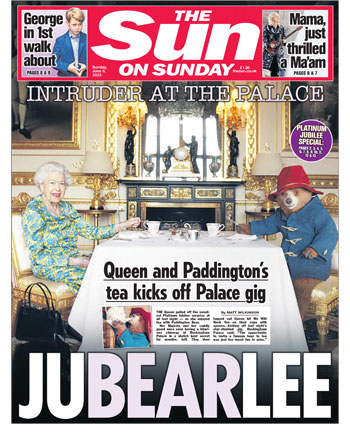
A quick word about that other event of the week: the small matter of a small woman meeting a small bear. The Palace gets so much wrong and the Press go so over the top on the adulation that it’s easy to miss a real moment. And when you’re publishing “glorious” 72-page glossy souvenir supplements and cooing over the “cheeky” foibles of little boys brought up in unimaginable privilege you risk having nothing left in the tank for the truly different.
Those are the only explanations I can think of for the Sundays that didn’t make a fuss of Paddington’s teatime date with the Queen.
The Sun gave it the full front page, but with a tortuous pun headline, when the obvious one was staring it in the face. If the Mail on Sunday for its “Cheers Ma’am” the previous week was a front built on a false history, I have to say that its cover this week was absolutely spot on.
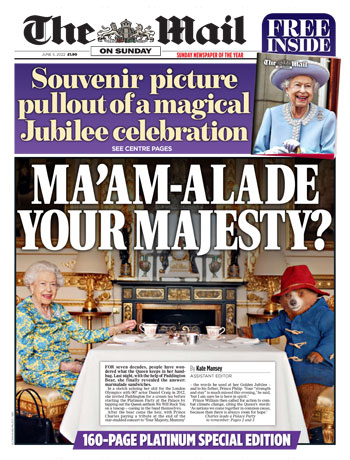
As to the rest? The Telegraph and Sunday Times both put the photograph at the heart of their covers, but it was all downhill after that.
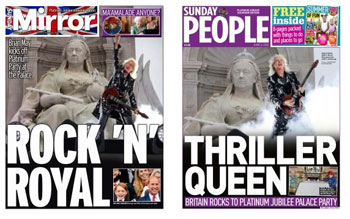
The Mirror and the People had it as a drop-in, both inexplicably majoring on Brian May next to the Victoria Memorial “kicking off” the party at the Palace. But he didn’t, did he? Were they stuck in a time warp that took them back to 2012, when he actually did, with his rooftop solo? The party started with the massed drummers’ “dum dum duh” rhythm, picked up by the Queen and Paddington with their teacups and teaspoons and then Adam Lambert taking a deep breath for his Freddie Mercury moment. I’m sorry, but May was not the man of the hour this time, however compelling the photograph.
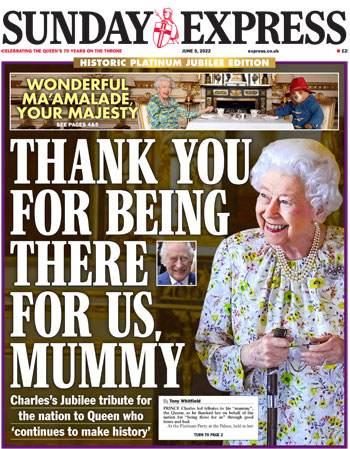
The Express was similarly stuck in its rut with a file picture of the Queen and “Thank you for being there for us, Mummy” tribute from Charles, with Paddington a shallow puff at the top. And as for the Observer, it was in a world of its own with a woman in a Union Flag t-shirt and a headline celebrating “A long weekend and a carnival of memory”. You can be as republican in your outlook as you like, but there’s no escaping the fact that this weekend was a celebration of one woman’s 70-year reign. You can either accept it as such or ignore it, but to give over half your front page to the festivities and yet try to pretend that they had nothing to do with royalty is barmy. At least the Star was more honest about its priorities, with its puff picture of the crowds in the Mall and “Party time for Her Maj” above a splash on Gemma Collins’s ghostly “new man”.
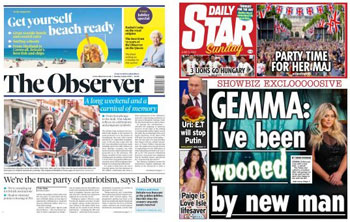
When it comes to the royals, any sense of perspective is – as noted here many times before – conspicuously lacking. Almost any other subject can be approached with seriousness, fun, joy, dismay, but these senses seem to desert Fleet Street’s finest the moment a duke or a princess hoves into view. Suddenly they catch a disease whose symptoms are utter obsequiousness, faux familiarity and speaking in tongues – using language never seen or heard elsewhere, such as “one” for the first person singular and “orf” for “off”.
There also seems to be sporadic blindness. I watched most of that Saturday night concert and almost every time the camera turned to young George, he had an air of someone bored out of their head and disdainful of the offerings before him. Maybe he was tired – he’d had a long day, including his first walkabout in Cardiff – and the likes of Rod Stewart and Diana Ross are probably not preferred listening for a nearly nine-year-old. But I do find it amazing that the one moment that made its way into print was the one where he was laughing with his father.
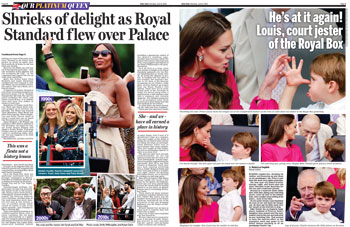
And then there was Louis, “stealing the show” by holding his hands over his ears at the flypast and thumbing his nose at his mother. “He’s at it again! Louis, court jester of the Royal Box” smiled the Mail indulgently in a headline on a photograph in which he is quite clearly being told off by a woman who definitely doesn’t see this as a laughing matter.
It seems to me that if you want to perpetuate the monarchy and support for the wider Royal Family, it would be wise to take your foot off the “aren’t they all wonderful” (apart from Andy and Megs, obvs) pedal and to ease up on the “A grateful nation salutes you Ma’am” gushing.
Damned if they do and damned if they don't

It goes without saying that the Queen was supposed to be the star of this show, but the fact that she appeared at only two of the set-piece events gave the gushers licence to fawn over Kate and find fault with Meghan. Except that didn’t quite go to plan. The Sussexes were always on a hiding to nothing, but they seemed to me to get it about as right as they could in the circumstances.
The antis were happy to highlight their “relegation” to the “second row” at St Paul’s, where they sat with the Queen’s other grandchildren, apart from the “working royals”. Would they heal the rift with the Cambridges? Did anyone seriously think that it would all be hugs and “mwah, mwah” kisses in the aisle?
Then they went off to Windsor rather than have lunch at the Palace, giving the Sun yet another “Megxit” splash – this incarnation being “Legs it”. This could be interpreted as being discreet and leaving centre stage. Because you can be sure that if they’d stayed, they’d have been accused of trying to hog the limelight.
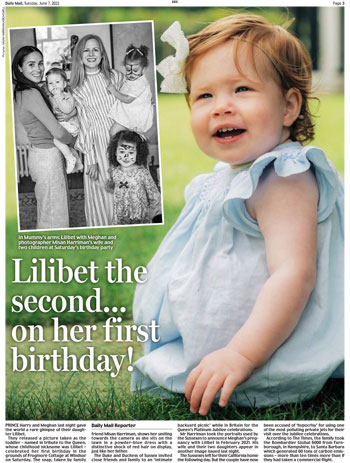
And when all the official celebrations were over, they released a photograph of their daughter, Lilibet, who had had her first birthday on Saturday. In the normal course of events, you’d expect the picture to be issued to coincide with the day. They had the sense not to do that. Did anyone note, let alone applaud, that gesture of restraint? No, of course not.
But the picture was on the front page of the Sun, page 3 of the Mail and in various forms in most other papers’ later editions on Tuesday. Just as Harry and Meghan had been on most fronts on Saturday. If, as these papers keep telling us, the public are sick of the couple, why should that be?
Cakeism.
An unhealthy obsession
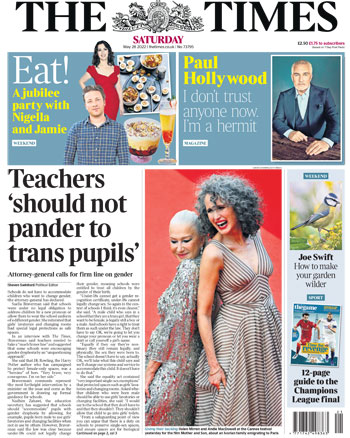
Do today’s Times subs and backbenchers know their Shakespeare or their Chaucer? Have they heard of the character Pandarus? He was the go-between for Troilus and Cressida, in Shakespeare’s incarnation a degenerate whose legacy to the language was the word pander – someone who, in the words of the OED, “ministers to the baser passions or evil designs of others”. And hence to the verb ‘to pander’, whose modern definitions include “to gratify or indulge an immoral or distasteful desire”. There are others that don’t venture into the realms of morality, but all have a flavour of disapproval and appeasement.
It came as something of a shock, therefore, to see the Saturday splash headline a couple of weeks ago: “Teachers ‘should not pander to trans pupils’”. This, apparently, was the view of Suella Braverman, though she appears not to have used the word, which featured in neither the text beneath the headline, nor the full interview inside.
What form would this “pandering” take? To use gender-neutral pronouns or let boys wear girls’ uniform or vice versa.
Were these really the biggest issues to concern the attorney general? The matters of greatest moment to tackle when you have a sit-down with the government’s most senior law officer? Well, it was clearly what mattered most to the Times, since the treatment of transgender people was the only subject to be addressed in the splash.
Similarly, the first half of the inside coverage was devoted to “the trans debate” – and how J K Rowling was “a heroine” – before moving on to Braverman’s background and her views on Brexit and sending asylum seekers to Rwanda. She had given advice on proposed legislation to override the Northern Ireland protocol and was braced to defend the Rwanda scheme, but did not elaborate. There appeared to be no other legal matters worth raising with Ms B, which seemed a bit of a waste of an opportunity.
Now here’s the thing. That Times leader I quoted earlier accused Boris Johnson of “fomenting new divisions” and “fostering culture wars”. But the paper’s own record on this is questionable. Another leader yesterday welcomed the “success of Muslim integration” and celebrated Britain’s diversity. Yet this is the paper that was outraged that a white girl should be trusted to Muslim foster parents. Another recent editorial spoke of “being kind” to trans people. Yet the paper’s news and comment sections rail at almost any official attempt at inclusivity.
The latest example came on Tuesday, with a report – and leader – on the assertion that the word “woman” had been excised from the NHS home pages for ovarian, womb and cervical cancers. The paper was alerted to this by a campaigning midwife and accepted the notion that the absence of the word could lead to confusion and lead to women not getting the treatment they need. I looked at the site; the home pages are effectively indexes which, as the Times reported, do not use the word “women”, whereas those for testicular or prostate cancer do use the word “men”. But if you follow the links to the relevant pages, they refer to “anyone with a womb, including women…”
I’m not convinced that anyone who goes to the trouble to consult the NHS website about such cancers would think “Oh, it mentions wombs and vaginas and cervixes but doesn’t say anything about women, so it’s not for me”, but there you go. We must applaud clarity.
Out of proportion
What troubles me is not the Times’s conclusion in this instance, but its preoccupation with the “trans debate”, which seems out of all proportion to the numbers of people involved, and the way it (and other papers, notably the Mail) derides attempts at inclusivity for transgender people in a way it would never contemplate if it were talking about black, homosexual or disabled people. All of whom are also legally regarded as having “protected characteristics”.
A couple of years ago, the Times successfully defended an unfair dismissal claim by a former Scotland night editor that she had lost her job because she was transgender (the paper, under a previous editor, had been supportive of her while she transitioned). The claimant’s case was in part based on the volume of “anti-trans” stories that appeared in the paper. The Times insisted it was not transphobic and fielded an army of its most senior executives, including the editor, his deputy, the managing editors, desk heads and HR chiefs, to counter her accusations. The tribunal concluded that there were sound editorial and financial reasons for the journalist to have been made redundant and that the decision had nothing to do with her trans status. For what it’s worth – and the claimant is a friend – I wouldn’t argue with that verdict. The Times didn’t report proceedings, but it did cover the result in both the news pages and the leader column. Since that time, the volume of copy has increased and much of it is hostile.
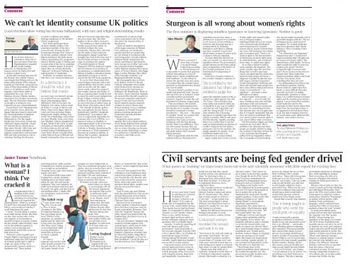
Over the past month, the paper has carried nearly 30 news stories, five opeds, three leaders and a weekend essay devoted entirely to “trans issues” – quite apart from casual references dotted through various columns. Besides Braverman, five interviewees have been asked their opinion on gender identification, including Education Secretary Nadhim Zahawi, who was a little more amenable than his ministerial colleague about cross-dress uniforms. Even Michael O’Leary was asked about it during an interview in last Saturday’s paper. Damian Whitworth’s piece was rightly focused on airport chaos, but it included the paragraph: “I ask him the question being asked of all politicians: what is a woman? ‘Way above my pay grade,’ he says. ‘We employ people regardless of their race, creed, gender’.”
Is this really the question being asked of all politicians? And if so, shouldn’t we be a bit concerned?
Small numbers
Best estimates suggest that there are about half a million people who could be classified as “gender non-conforming”, this encompasses the full spectrum from people who have surgically changed gender to those who occasionally cross-dress. There are probably around 200,000 binary trans people – split about 50-50 between male-to-female and female-to-male. Of these, only a third are “out”, and we tend to read only about trans women. If you’re not “out”, you’re not using the other gender’s loos or having any other overt impact on society, so the Times is fixated on about 30-35,000 people out of a population of nearly 70 million.
I’m not saying that the news stories that appear in the Times are not valid – although a number seem to be the result of tips from “experts” with an axe to grind – or that the paper and its writers are not entitled to their opinions. There are legitimate questions to be asked about the pressure on and support available to vulnerable young people contemplating life-changing decisions. The gender recognition legislation debate in Scotland is of clear public interest, as are inconsistent rules for athletes. But there is a lack of balance, so that the coverage is overwhelmingly negative. The paper published several stories about the schoolgirl “hounded out” for what classmates regarded as a transphobic question, but I have yet to read about boys or girls bullied for cross-dressing, and reporting of the high suicide / depression rates among trans people is near invisible.
Even more than that, though, it is the obsession that worries me: the apparent requirement that reporters and interviewers should raise the subject with everyone they speak to, regardless of what they're there to talk about, and the unwonted prominence of some of the stories, such as the double column headline “Medal for campaigner accused of transphobia” on the Birthday Honours spread. Here was a woman given a BEM – the lowest honour – getting her own headline while Salman Rushdie, Quentin Blake and Marina Warner being made companions of honour – the highest award – managed only a passing mention in the wrap, just above Gregg Wallace and John Torode.
During that same month, I found only five stories focused on people with disabilities, apart from Melanie Reid’s weekly magazine column. Yet there are millions of those. Indeed, the paper reported that 118,000 of them had wrongly had their benefits cut. That’s more than the entire trans female population.
The argument is, of course, that more than 50% of the population are “biological” women and that our rights and security are being threatened by freedoms being afforded to that minority. Even if that is the case, I believe that there are greater concerns for most readers. Like the cost of living, the war in Ukraine, poverty, food banks, education, childcare, hospital waiting times, Brexit…
The Times is often a voice of reason and tolerance in a divisive political world. It is considered over Brexit, it shuns the shrill partisanship of the Mirror and Mail when writing about Johnson. Perhaps it could heed its own advice when it comes to trans issues, give its hobby horse a rest, and just be more kind.
A setback for #MeToo?
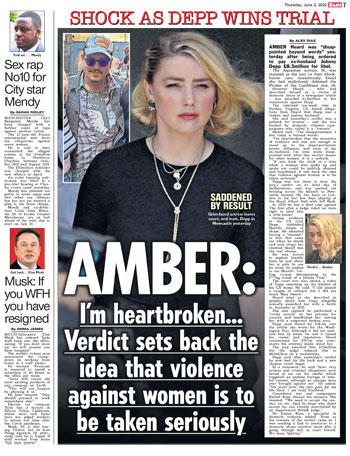
Women’s rights and security have also been to the fore with the conclusion of the Johnny Depp-Amber Heard libel case in America. When you have two professional actors as the central characters of a court case, it’s hard to determine who is hamming it up and who is telling the truth.
For the casual observer, Heard had the harder task, convincing an adoring fan base that its hero was not as they imagined but a wife-beater. Never mind that she had proved her claims to the satisfaction of a British judge in a previous libel case, brought by Depp against the Sun in the autumn of 2020.
The televised hearing in the States, where a jury rather than a solitary judge, was to decide between the two, was a tawdry spectacle. Hats off to Nick Wallis – journalistic hero of the sub-postmaster scandal – for sticking with it to tweet day in, day out (his retrospective in the Sunday Times is a good read). A five-minute news bulletin slot was more than most of us could stomach.
So when the verdict came – a multimillion-dollar vindication for Depp – few of us had any real concept of whether it was just or fair. We still don’t really know. But it’s been interesting to see the press take on the case and how it has changed over the past week or so.
The Sun, with a horse in this race, was obviously on Heard’s side from the outset. Its verdict report was not about Depp’s win, but about her heartbreak, while everyone else played it fairly straight. The Sun approach jarred at the time, particularly with its random quotes at the end from the likes of Rachel Riley tweeting her dismay.
But then others began to wake up to the idea that this might have been a dangerous verdict; that the Sun (maybe unwittingly and out of self-interest) was on to something: abused women might be reluctant to come forward, the progress made by the #MeToo movement might be undone.
Oped writers chimed in; Gaby Hinsliff contributed a thoughtful piece for the Guardian Journal cover. Charlie Gowans-Eglington in the Times deemed it a disastrous message to victims of domestic violence.
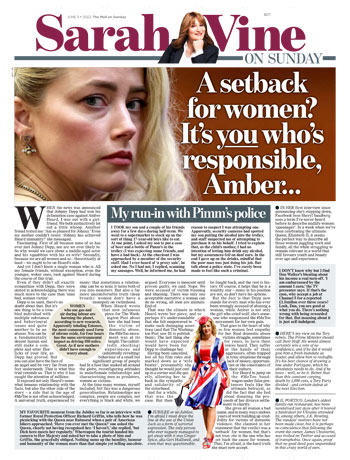
Then there was the Mail. True to form, it was captivated by Depp’s antics in the UK at the time the verdict came in, pubbing in the NorthEast, jamming with Jeff Back, cuddling a badger.
And, again true to form, it took aim at the woman. First Jan Moir in the daily, with “Amber wanted to be a heroine, but now she’s defined by this circus of madness”. And then Sarah Vine in the Sunday. Under the headline: “A setback for women? It’s you who’s responsible Amber”, she wrote: “When the news was announced that Johnny Depp had won his defamation case against Amber Heard, I was out with a girlfriend. We both instinctively let out a little whoop,” continuing later: “All my female friends, without exception, even the younger, woker ones, took against Heard during the course of this trial.”
Never mind the evidence, let’s just rely on instinct and prejudgment.
Front page of the fortnight
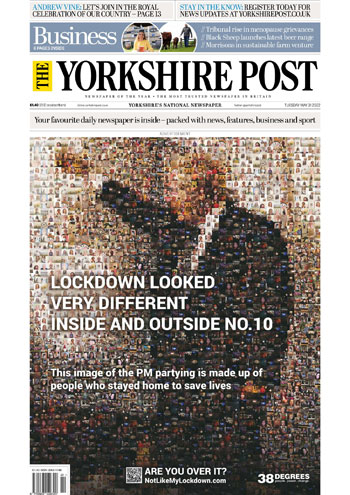
Here’s a quandary. This, from the Yorkshire Post, is the most striking. Editor James Mitchinson was sufficiently proud of it to tweet it out. But it wasn’t his work. Or that of his editorial team. It is a wraparound by a campaign organisation. So, does it count?
There were a couple of other mosaics worthy of note, though. Both the i and the Telegraph magazine had a play around with that familiar silhouette.
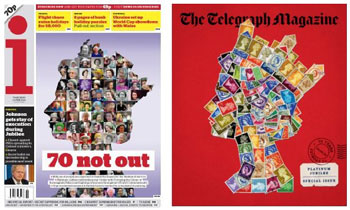
And then, having mocked the Express for its obsequiousness. I did think this was a clean jubilee offering.
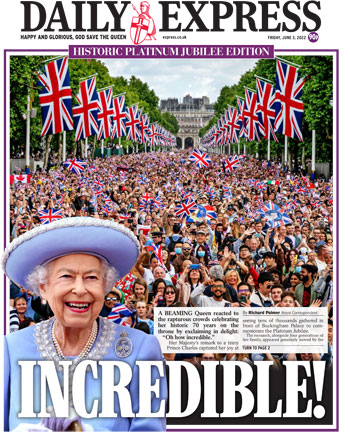
Liz Gerard’s Notebook is a fortnightly column published in the InPubWeekly newsletter. To be added to the mailing list, enter your email address here.












